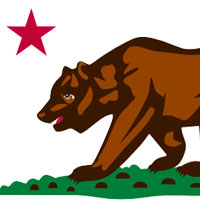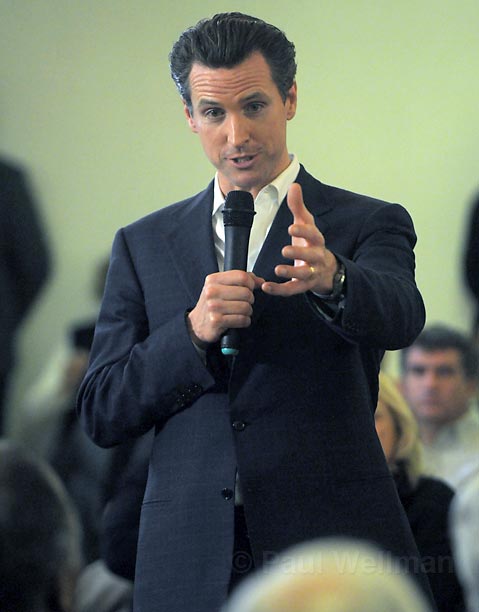Rx for Gavin Newsom
Rave Reviews for San Francisco Health Plan Give Needed Boost to Dem Hopeful
San Francisco Mayor Gavin Newsom looks like that rarest of politicians in the summer of 2009-a candidate who could actually benefit from the volatile national brawl euphemistically known as the healthcare reform debate.
As the airwaves have filled with images of angry confrontations at town hall meetings from California to Connecticut, the popularity of President Barack Obama and congressional Democrats and Republicans alike has plummeted amid the cacophony. But Newsom, who’s been lagging in his bid to capture the Democratic nomination for governor, has just won favorable reviews for a universal healthcare program in San Francisco that he has made the centerpiece of his statewide effort.

“The San Francisco experiment is working, and it’s working well,” said Ken Jacobs of the UC Berkeley Labor Center, which has just concluded a study of the program. Jacobs, who co-authored a New York Times op-ed praising Newsom and the universal insurance program, added, “The public option has proved popular with individuals and employers alike, while not displacing the private market.”
As a public policy matter, the Berkeley study is significant, coming at a time when the central issues in the country’s debate about healthcare is whether the government should sponsor such a “public option” alternative for affordable medical insurance in competition with private insurers. As a political matter, it gives weight to Newsom’s campaign trail claims that his city’s program represents a model for the U.S.

The program, called Healthy San Francisco, was created in 2007 and aimed at providing insurance to 60,000 city residents who didn’t have it, whether or not they were employed, had a pre-existing condition, or were in the country illegally. Since 2007, it has extended coverage to about 45,000 of them, according to the San Francisco Chronicle, which said the program costs about $120 million a year, financed through a combination of city funds, employer contributions, grants, and modest fees charged to participants.
Perhaps the most controversial feature of the project requires all companies operating in the city with at least 20 employees to provide private insurance or contribute to the public plan. Although a legal challenge to the program by businesses is now before the U.S. Supreme Court, the Berkeley study found that “the employer requirement has not led to the job losses that many feared.” (One major shortcoming of the plan, however, is that those enrolled are only covered within the city-woe to someone who gets hit by a bus in Oakland, across San Francisco Bay.)
Newsom staged a press conference last week with the author of the study, where he was also joined by John Sweeney, president of the AFL-CIO. And while the San Francisco mayor was doubtless pleased by the encomiums of the academic types, the smiles and praise he received from labor leaders carry far more value in a Democratic primary.
The mayor has struggled to gain traction for his campaign, in which he is expected to face Attorney General Jerry Brown, who has not yet officially announced he’s running for governor but has made his intention to do so very clear. Newsom not only trails Brown statewide, by 49-20 percent, according to a just-released survey by Sacramento pollster James Moore, but also runs behind in his own city: A second new poll, conducted by San Francisco-based David Binder & Associates, shows him losing to Brown, 51-34 percent, among his own constituents.
Amid the dreary horserace news, however, the high marks given his healthcare plan at least offered Newsom some vindication on the signature issue of his time in office. Said Jacobs of UC Berkeley: “These are important lessons for the national debate.”
WHO’S ON HEALTHCARE? With the apparent assent of the White House, the crucial effort to produce “compromise” healthcare reform legislation has been vested with six members of the Senate Finance Committee, three from each party. The Democrats are Max Baucus of Montana, Jeff Bingaman of New Mexico, and Kent Conrad of North Dakota and the Republicans are Charles Grassley of Iowa, Olympia Snowe of Maine, and Mike Enzi of Wyoming.
Collectively, they represent only 2.7 percent of the nation’s population. For a sense of scale, consider, for example, that Conrad in his last reelection won 150,416 votes-less than the 151,218 tallied by the first-place finisher in the race for the L.A. Community College Board! Who put these guys in charge?
Rep. Lois Capps will be holding healthcare meetings throughout the district, including a September 2 meeting in Santa Barbara.



